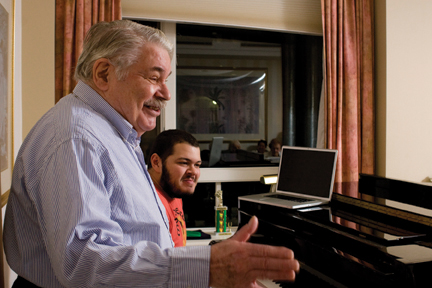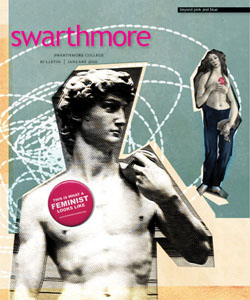Come to the Cabaret
Peter Conway ’51 recalls his halcyon days as part of New York City’s arts scene.

Peter Conway entertains residents at Youville House with his singing while accompanied by a Brazilian music student from the Berklee School of Music in Boston.
During the mid-20th century in New York City, smoke-filled night clubs could be found on just about every corner and the voices of Mabel Mercer, Janice Mars, Billie Holiday, and Thelma Nevins, among many others, sang their way into people’s souls. Listening and singing himself was Clarke Peyton “Peter” Conway ’51.
Through full-time work as a publicist and a 30-year singing career, Conway befriended some of the biggest names in cabaret music and the arts scene.
In the early 1980s, he worked as a publicist for the New York City Ballet. “George Balanchine was a genius who thought he could do anything he pleased. I’d work my ass off getting interviews for his dancers with, say, The New Yorker—and you don’t get these every day. It would be all set up. We’d check and check with Balanchine to make sure it was OK, and then a half-hour before the interview, he would cancel it for the dancer. This makes the press agent look pretty bad. This didn’t happen just once, it happened all the time.”
But Conway’s connections to these venues also gave him insight into extraordinary talents such as Russian-born prima ballerina Alexandra Danilova, with whom Balanchine collaborated for many years. Conway interviewed her extensively for the New York City Public Library’s oral history dance project in 1978, resulting in a close friendship. For seven years, he continued to interview other dancers including Frederic Franklin, Fernand Nault, and Carol Sumner for the project.
Mabel Mercer, Conway’s favorite cabaret singer, visited him at his apartment. “Mabel told me I had a beautiful voice. But that’s not what I wanted to hear. I wanted her to say, what a wonderful stylist you are, you’re making the lyrics into a compelling story,” Conway, a baritone, says. “That’s what I try to do, tell a story through the lyrics of something that has happened to me or believe others can benefit from hearing. Themes of cabaret music are usually ones of disillusionment and disenchantment. It’s worldly and sophisticated. It speaks to me.”
Conway’s interest in music dates back to his youth, but his first public gigs were at Swarthmore, where he sang informally with a combo of musicians at a dance each Wednesday night in Parrish Commons and twice directed, produced, and performed in Roccatorso, a musical revue.
Conway went on to Yale, obtaining a master of arts in teaching and a year later spent a semester at the Yale Drama School. While at the drama school, he had an opportunity to meet playwright Tennessee Williams, who was opening Camino Real in New Haven. Conway invited Williams to a party. Williams attended and complained about hearing Mabel Mercer’s music playing on the record player. “I changed the music,” says Conway, still somewhat annoyed.
In 1953, Conway was drafted into the Army. He was assigned to Special Services and ended up in Yokohama, Japan, creating 14 cabaret shows in 16 months for the military. The Army also made audio tapes for recruiting purposes of PFC Conway being interviewed and singing. “The Army wanted to show how people could fulfill their ambitions in the military,” Conway says.
After the Army, Conway returned to New York City, where he worked as a publicist for book publishers, dance companies, the Hunter College Concert Bureau, and for six years taught English at a prep school. He also continued to sing, nights and weekends, in clubs around the city, and received glowing press reviews.
He was the press director at Carnegie Hall for one year in the early 1970s under a temperamental executive director. “He was extremely self important and did everything he could to tear down my self-confidence,” Conway says.
He also sang in clubs in Nantucket, Mass., in the 1970s and in Keene, N.H., in the 1980s, where he owned homes with his life partner Paul Brazeau.
Conway and Brazeau, a pharmacology professor who had served as department chair at Albert Einstein College of Medicine, had been together for more than 50 years when Brazeau died four years ago. Conway now lives in Youville House, an assisted-living facility in Cambridge, Mass.
Today, the 80-year-old still sings a variety of standards and jazz songs for pleasure, with another Youville resident accompanying him, or with Brazilian musicians (one of whom is pictured above) from the Berklee School of Music who perform regularly at Youville House.
“My favorite song is By Myself. It’s a sad song, but I like to see the reaction to stories I sing,” Conway says. “Singing still brings me the most joy in the world.”
 Email This Page
Email This Page
August 12th, 2010 7:01 am
hello from an olde friend from both Ft Monmouth, and later NYC…Pete you had been so helpful during those days of just starting out in NY…Now retired and still with Matt my partner for so many years…live in Fort Lauderdale during the winters and have a house in France for the summers…..fond memories of the past..if you recive this I would love a fewwords…Alll the best and keep on singing! George